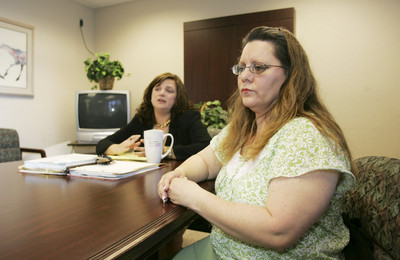Need for legal aid outstrips supply
Jeannie Richard's legal problems began last year after she took out a $250 payday loan and fell behind on her payments.
The loan center, which was charging a whopping 1,202 percent interest rate on the loan, sued her in small-claims court for failing to fulfill the terms of her contract.
At the same time, attorneys with the Legal Aid Center of Southern Nevada were reviewing small-claims files and found Richard's case. They sent her a letter and offered to represent her in a class action lawsuit against the loan center.
"She's a special case, because we contacted her," attorney Stefanie Ebbens said.
Richard, 51, is one of more than 13,000 people who received free services last year from the Legal Aid Center. The center turned away countless others.
According to an assessment of Nevada's civil legal needs, published last year, the state has 4,706 people living in poverty for every legal aid attorney.
The ratio in Clark County is higher: 5,495-to-1.
"We all knew that there was a great need in Nevada for legal services for the disadvantaged, but I believe that we were all surprised by the numbers," said Suzan Baucum, executive director of the Nevada Law Foundation.
The assessment was commissioned by the Nevada Supreme Court's Access to Justice Commission, which was created in June 2006, and has spurred a fundraising campaign to increase legal resources for the disadvantaged.
As part of the assessment, a telephone survey was conducted in November 2007. The survey of 1,000 residents revealed that more than two-thirds of the state's low- to moderately low-income households experience significant civil legal problems that would normally require some assistance from an attorney to resolve them.
The survey also showed that only 20 percent of those with one or more legal problems received help from a lawyer for at least one, but not all, of the legal problems they identified.
"People don't come in the door with one problem," Ebbens said.
In Richard's case, her legal woes mounted after she was laid off from her job in early November.
Her car was soon repossessed. She was denied Social Security supplemental income for her 10-year-old son, a special education student who was having behavioral problems. And she was forced out of two homes by landlords who were facing foreclosures.
"It was a very rough five and a half months," Richard said.
Legal Aid Center employees helped her address all those issues. Without their help, Richard said, she and her son would have needed to share a residence with her two adult daughters and three grandchildren, or move to Denver to live with extended family members that she hasn't seen for years.
Richard, a 24-year resident of Las Vegas, was hired in March as a billing representative for a medical insurance company and is getting back on her feet.
Others in her shoes don't always fare so well.
"When your life is in a delicate balance, it only takes one thing to put you over the edge," state Supreme Court Justice Michael Douglas said.
Douglas, who once worked as an attorney for Nevada Legal Services, and Justice James Hardesty serve as co-chairmen of the Access to Justice Commission.
"You can't go any place in this community right now and not see a need for an attorney," Douglas said.
He noted that those who were surveyed cited housing as one of their top legal issues, and that was before the mortgage crisis reached its height.
"If you don't have a place to live, everything spirals out of control," the justice said.
Other top issues included finances, family, benefits and employment.
"We just turn away so many people because we don't have the capacity or resources to help them," said Lynn Etkins, development director for the Legal Aid Center of Southern Nevada.
Etkins is one of 22 full-time attorneys who work at the center.
The Nevada Law Foundation provides funding for the Legal Aid Center of Southern Nevada, Washoe Legal Services, Nevada Legal Services, Volunteer Attorneys for Rural Nevadans, the City of Las Vegas Senior Citizens Law Project and the Washoe County Senior Law Project.
Most of the foundation's budget, which was $1.5 million in 2008, comes from interest earned on lawyers' trust accounts.
Baucum said lawyers are not allowed to keep the interest earned on trust accounts, where they place money from clients and third parties for safekeeping.
Last year, representatives of the Nevada Law Foundation began negotiating with banks to increase interest paid on lawyers' trust accounts. More than a dozen banks agreed to pay an interest rate of 2 percent or higher through the end of this year.
Attorney Robert Eglet, vice chairman of the foundation, said the increase makes a big difference at a time when many banks are paying a 0.25 percent interest rate. He said the average daily balance of all lawyers' trust accounts in Nevada is around $100 million.
Eglet said foundation representatives now are trying to persuade lawyers and law firms to move client trust accounts to banks paying the higher interest rates.
The foundation also kicked off an aggressive fundraising campaign early this month.
"If each lawyer gave just a little bit, we would be able to fully fund and ensure access to justice to everyone in Nevada," Eglet said.
Contact reporter Carri Geer Thevenot at cgeer@reviewjournal.com or 702-380-8135.

















